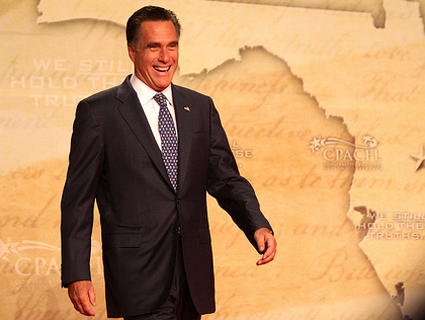
Mitt Romney at CPAC in Florida in 2011.<a target="_blank" href="http://www.flickr.com/photos/gageskidmore/6182516709/sizes/m/in/photostream/">Flickr/Gage Skidmore</a>
Mitt Romney has run two different campaigns when it comes to immigration. In South Carolina, he railed against comprehensive immigration reform, declaring that he has “one simple rule: no amnesty.” He touted the endorsement of Kris Kobach, a Republican anti-immigrant hardliner who helped write restrictive immigration laws in Alabama and Arizona and wants to abolish birthright citizenship.
Elsewhere, however, Romney struck a different tone. He told a Republican audience in Florida that he wasn’t sure whether a legislative proposal that would allow undocumented immigrants in the United States to remain in the country constituted amnesty. “There are some who get involved in whether it is technically amnesty or not, and I’m not really trying to define what is technically amnesty, I’ll let the lawyers do that.” Romney’s against “amnesty,” he just isn’t quite sure what it is.
I’m not talking about Romney’s 2012 primary campaign. I’m talking about his 2008 campaign.
The above examples come straight from the 2008 McCain campaign’s opposition research tome, unearthed by Buzzfeed’s Andrew Kaczynski, but Romney’s basically running the same double game in South Carolina and Florida this year. Back then, he was in the midst of a delicate balancing act, trying to avoid excoriating President George W. Bush’s immigration reform efforts while still hitting McCain, a key supporter of those efforts, from the right. This year he’s trying to avoid alienating too many Latino voters, while still jabbing the relatively more moderate Newt Gingrich. As in 2008, Romney is using an endorsement from Kobach, formerly the head of the Kansas Republican Party and now Kansas Secretary of State, to prove his commitment to restrictive immigration policies.
Bloomberg Businessweek‘s Julie Hirschfeld Davis reports:
In Florida, Republican presidential front-runner Mitt Romney is airing campaign commercials in Spanish telling Hispanics he’s “one of us.” In South Carolina, he is touting the endorsement of Kris Kobach, an anti-immigration activist who helped spearhead state laws that have sparked anger among Latinos.
What’s remarkable is not just that Romney is enaging in virtually the same kind of doubletalk on immigration that he did in 2008—in the same states—it’s that he thinks it’s going to work.
The idea seems to be that Romney can campaign one way in English in South Carolina, and then sound like an immigration moderate in Spanish while campaigning in Florida. Perhaps the assumption is that the presumed Spanish-speaking audience for Romney’s Florida ads won’t have access to his harsher remarks on immigration.
That would be a deeply silly assumption. A recent study from Pew’s Project for Excellence in Journalism showed that the Spanish-language media thrived even through the recession, with the Univision network growing its audience and Spanish-language newspapers losing less of their readerships than their English-language counterparts. Bottom line: Romney’s Spanish language ads aren’t going to blot out his record on immigration any more than Obama will be able to hide those one million deportations.
There’s another reason why Latino voters, particularly in Florida, aren’t likely to be moved by Romney’s ads. Rival Newt Gingrich, who has struck a more moderate tone than Romney on immigration, has started running Spanish-language radio ad accusing Romney of being a “government liberal” and “anti-immigrant candidate.” Gingrich’s ad also reminds voters in Miami of the last time Romney was running for president, when he accidentally appropriated a pro-Castro slogan (“Fatherland or Death, we will prevail”) at political rally. Awkward.














